2020年江苏高考英语试卷-(含答案)
- 格式:doc
- 大小:101.00 KB
- 文档页数:15
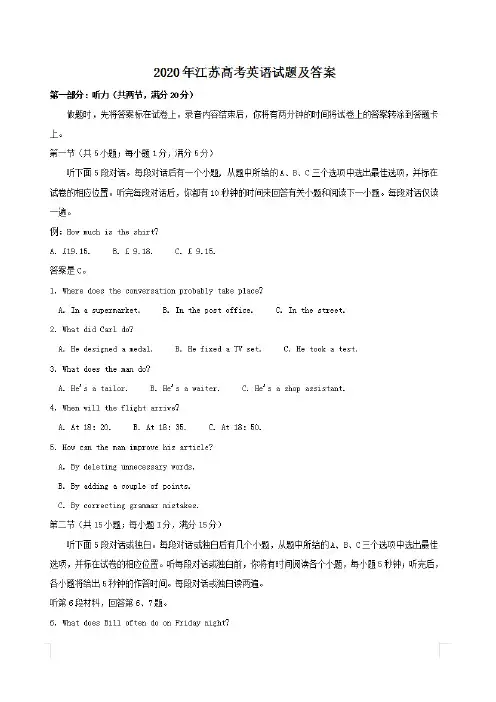
A. Visit his parents.B. Go to the movies.C. Walk along Broadway.7. Who watches musical plays most often?A. Bill.B. Sarah.C. Bill's parents.听第7段材料,回答第8、9题。
8. Why does David want to speak to Mike?A. To invite him to a party.B. To discuss a schedule.C. To call off a meeting.9. What do we know about the speakers?A. They are colleagues.B. They are close friends.C. They've never met before. 听第8段材料,回答第10至12题。
10. What kind of camera does the man want?A. A TV camera.B. A video camera.C. A movie camera.11. Which function is the man most interested in?A. Underwater filming.B. A large memory.C. Auto-focus.12. How much would the man pay for the second camera?A. 950 euros.B. 650 euros.C. 470 euros.听第9段材料,回答第13至16题。
13. Who is Clifford?A. A little girl.B. The man's pet.C. A fictional character.14. Who suggested that Norman paint for children's books?A. His wife.B. Elizabeth.C. A publisher.15. What is Norman's story based on?A. A book.B. A painting.C. A young woman.16. What is it that shocked Norman?A. His unexpected success.B. His efforts made in vain.C. His editor's disagreement.听第10段材料,回答第17至20题。
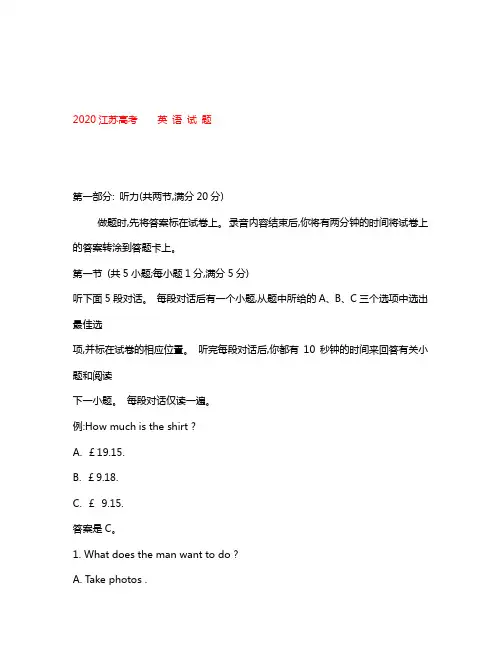
2020江苏高考英语试题第一部分: 听力(共两节,满分20分)做题时,先将答案标在试卷上。
录音内容结束后,你将有两分钟的时间将试卷上的答案转涂到答题卡上。
第一节(共5小题;每小题1分,满分5分)听下面5段对话。
每段对话后有一个小题,从题中所给的A、B、C三个选项中选出最佳选项,并标在试卷的相应位置。
听完每段对话后,你都有10秒钟的时间来回答有关小题和阅读下一小题。
每段对话仅读一遍。
例:How much is the shirt ?A. £19.15.B. £9.18.C. £9.15.答案是C。
1. What does the man want to do ?A. Take photos .B. Buy a camera .C. Help the woman.2. What are the speakers talking about ?A. A noisy night .B. Their life in town .C. A place of living.3. Where is the man now ?A. On his way.B. In a restaurant .C. At home.4. What will Celia do ?A. Find a player .B. Watch a game.C. Play basketball .5. What day is it when the conversation takes place?A. Saturday.B. Sunday.C. Monday.第二节(共15小题;每小题1分,满分15分)听下面5段对话或独白。
每段对话或独白后有几个小题,从题中所给的A、B、C三个选项中选出最佳选项,并标在试卷的相应位置。
听每段对话或独白前,你将有时间阅读各个小题,每小题5秒钟;听完后,各小题将给出5秒钟的作答时间。
每段对话或独白读两遍。
听第6段材料,回答第6、7题。
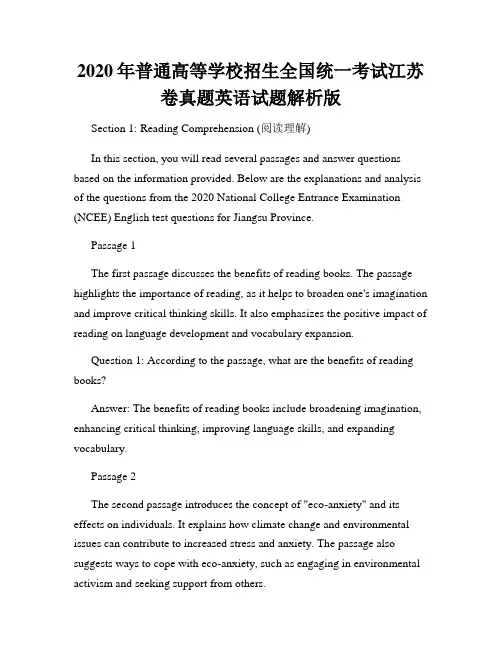
2020年普通高等学校招生全国统一考试江苏卷真题英语试题解析版Section 1: Reading Comprehension (阅读理解)In this section, you will read several passages and answer questions based on the information provided. Below are the explanations and analysis of the questions from the 2020 National College Entrance Examination (NCEE) English test questions for Jiangsu Province.Passage 1The first passage discusses the benefits of reading books. The passage highlights the importance of reading, as it helps to broaden one's imagination and improve critical thinking skills. It also emphasizes the positive impact of reading on language development and vocabulary expansion.Question 1: According to the passage, what are the benefits of reading books?Answer: The benefits of reading books include broadening imagination, enhancing critical thinking, improving language skills, and expanding vocabulary.Passage 2The second passage introduces the concept of "eco-anxiety" and its effects on individuals. It explains how climate change and environmental issues can contribute to increased stress and anxiety. The passage also suggests ways to cope with eco-anxiety, such as engaging in environmental activism and seeking support from others.Question 2: What is eco-anxiety?Answer: Eco-anxiety refers to increased stress and anxiety caused by climate change and environmental issues.Section 2: Vocabulary and Grammar (词汇与语法)In this section, you will be tested on your knowledge of vocabulary and grammar usage through various sentence completion and error correction tasks.Question 3: Choose the word that best completes the sentence: The company has experienced significant ________ since the new CEO took over.a) growthb) strengthc) deficitd) reductionAnswer: a) growthQuestion 4: Identify the grammatical error in the following sentence: She don't have enough time to finish her work.Answer: The sentence should be corrected to "She doesn't have enough time to finish her work." The verb "don't" should be changed to "doesn't" to match the singular subject "She."Section 3: Cloze Test (完型填空)In this section, you will read a passage with missing words and select the most appropriate option to fill in the gaps.PassageThe passage discusses the importance of perseverance in achieving goals. It shares stories of successful individuals who have overcome challenges and setbacks through their determination and hard work.Question 5: Which word best fits in the gap? In order to succeed, one must have ________ and never give up.a) ambitionb) motivationc) perseveranced) talentAnswer: c) perseveranceSection 4: Translation (翻译)In this section, you will be asked to translate a sentence from Chinese to English or vice versa.Question 6: Translate the following sentence from English to Chinese: "He is studying at a prestigious university in the United States."Answer: "他正在美国一所著名的大学学习。
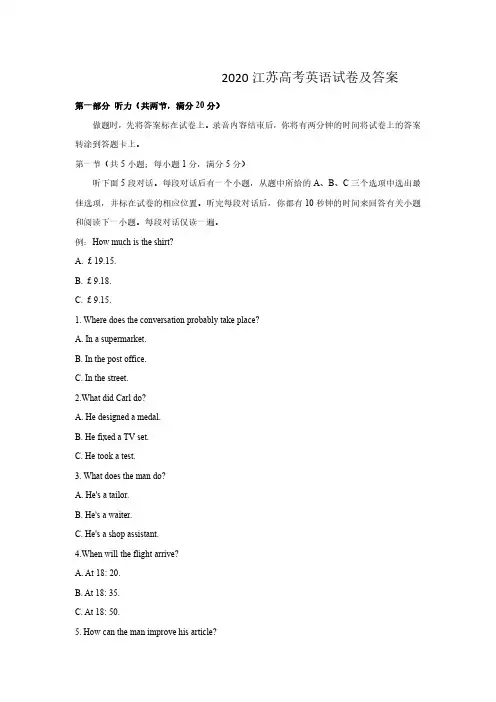
2020江苏高考英语试卷及答案第一部分听力(共两节,满分20分)做题时,先将答案标在试卷上。
录音内容结束后,你将有两分钟的时间将试卷上的答案转涂到答题卡上。
第一节(共5小题;每小题1分,满分5分)听下面5段对话。
每段对话后有一个小题,从题中所给的A、B、C三个选项中选出最佳选项,并标在试卷的相应位置。
听完每段对话后,你都有10秒钟的时间来回答有关小题和阅读下一小题。
每段对话仅读一遍。
例:How much is the shirt?A.£19.15.B.£9.18.C.£9.15.1.Where does the conversation probably take place?A.In a supermarket.B.In the post office.C.In the street.2.What did Carl do?A.He designed a medal.B.He fixed a TV set.C.He took a test.3.What does the man do?A.He's a tailor.B.He's a waiter.C.He's a shop assistant.4.When will the flight arrive?A.At18:20.B.At18:35.C.At18:50.5.How can the man improve his article?A.By deleting unnecessary words.B.By adding a couple of points.C.By correcting grammar mistakes.第二节(共15小题:每题1分,满分15分)听下面5段对话或独白。
每段对话或独白后有几个小题,从题中所给的A、B、C三个选项中选出最佳选项,并标在试卷的相应位置。
听每段对话或独白前,你将有时间阅读各个小题,每小题5秒钟;听完后,各小题将给出5秒钟的作答时间。
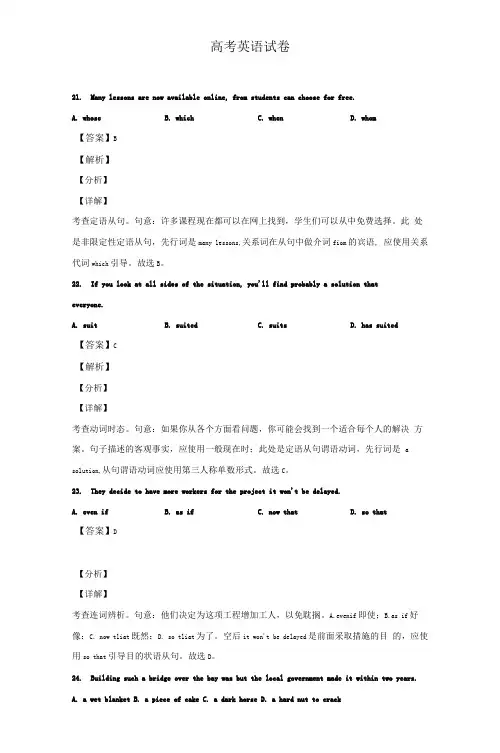
高考英语试卷21.Many lessons are now available online, from students can choose for free.A. whoseB. whichC. whenD. whom【答案】B【解析】【分析】【详解】考查定语从句。
句意:许多课程现在都可以在网上找到,学生们可以从中免费选择。
此处是非限定性定语从句,先行词是many lessons,关系词在从句中做介词fiom的宾语, 应使用关系代词which引导。
故选B。
22.If you look at all sides of the situation, you'll find probably a solution thateveryone.A. suitB. suitedC. suitsD. has suited【答案】C【解析】【分析】【详解】考查动词时态。
句意:如果你从各个方面看问题,你可能会找到一个适合每个人的解决方案。
句子描述的客观事实,应使用一般现在时;此处是定语从句谓语动词,先行词是 a solution,从句谓语动词应使用第三人称单数形式。
故选C。
23.They decide to have more workers for the project it won't be delayed.A. even ifB. as ifC. now thatD. so that【答案】D【分析】【详解】考查连词辨析。
句意:他们决定为这项工程增加工人,以免耽搁。
A.evenif即使;B.as if好像:C. now tliat既然:D. so tliat为了。
空后it won't be delayed是前面采取措施的目的,应使用so that引导目的状语从句。
故选D。
24.Building such a bridge over the bay was but the local government made it within two years.A. a wet blanketB. a piece of cakeC. a dark horseD. a hard nut to crack【分析】【详解】考查习惯用语辨析。
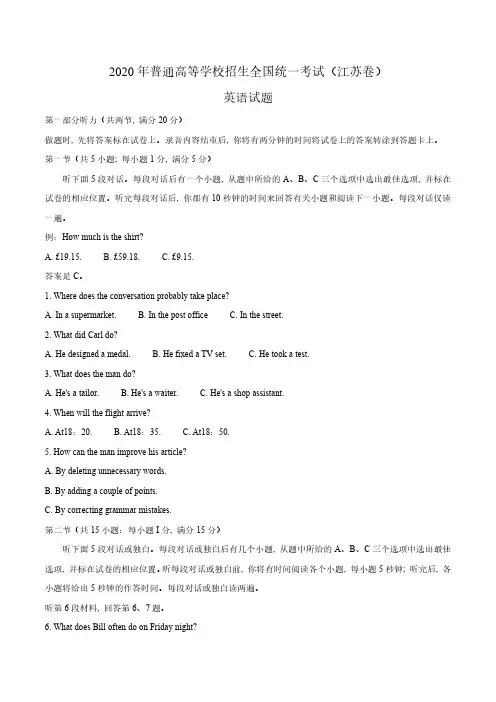
2020年普通高等学校招生全国统一考试(江苏卷)英语试题第一部分听力(共两节,满分20分)做题时,先将答案标在试卷上。
录音内容结束后,你将有两分钟的时间将试卷上的答案转涂到答题卡上。
第一节(共5小题;每小题1分,满分5分)听下面5段对话。
每段对话后有一个小题,从题中所给的A、B、C三个选项中选出最佳选项,并标在试卷的相应位置。
听完每段对话后,你都有10秒钟的时间来回答有关小题和阅读下一小题。
每段对话仅读一遍。
例:How much is the shirt?A.£19.15.B.£59.18.C.£9.15.答案是C。
1.Where does the conversation probably take place?A.In a supermarket.B.In the post officeC.In the street.2.What did Carl do?A.He designed a medal.B.He fixed a TV set.C.He took a test.3.What does the man do?A.He's a tailor.B.He's a waiter.C.He's a shop assistant.4.When will the flight arrive?A.At18:20.B.At18:35.C.At18:50.5.How can the man improve his article?A.By deleting unnecessary words.B.By adding a couple of points.C.By correcting grammar mistakes.第二节(共15小题:每小题I分,满分15分)听下面5段对话或独白。
每段对话或独白后有几个小题,从题中所给的A、B、C三个选项中选出最佳选项,并标在试卷的相应位置。
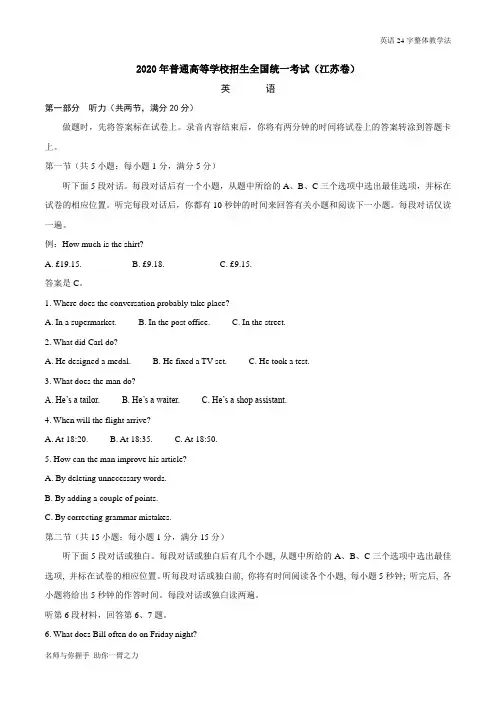
2020年普通高等学校招生全国统一考试(江苏卷)英语第一部分听力(共两节,满分20分)做题时,先将答案标在试卷上。
录音内容结束后,你将有两分钟的时间将试卷上的答案转涂到答题卡上。
第一节(共5小题;每小题1分,满分5分)听下面5段对话。
每段对话后有一个小题,从题中所给的A、B、C三个选项中选出最佳选项,并标在试卷的相应位置。
听完每段对话后,你都有10秒钟的时间来回答有关小题和阅读下一小题。
每段对话仅读一遍。
例:How much is the shirt?A. £19.15.B. £9.18.C. £9.15.答案是C。
1. Where does the conversation probably take place?A. In a supermarket.B. In the post office.C. In the street.2. What did Carl do?A. He designed a medal.B. He fixed a TV set.C. He took a test.3. What does the man do?A. He’s a tailor.B. He’s a waiter.C. He’s a shop assistant.4. When will the flight arrive?A. At 18:20.B. At 18:35.C. At 18:50.5. How can the man improve his article?A. By deleting unnecessary words.B. By adding a couple of points.C. By correcting grammar mistakes.第二节(共15小题;每小题1分,满分15分)听下面5段对话或独白。
每段对话或独白后有几个小题, 从题中所给的A、B、C三个选项中选出最佳选项, 并标在试卷的相应位置。
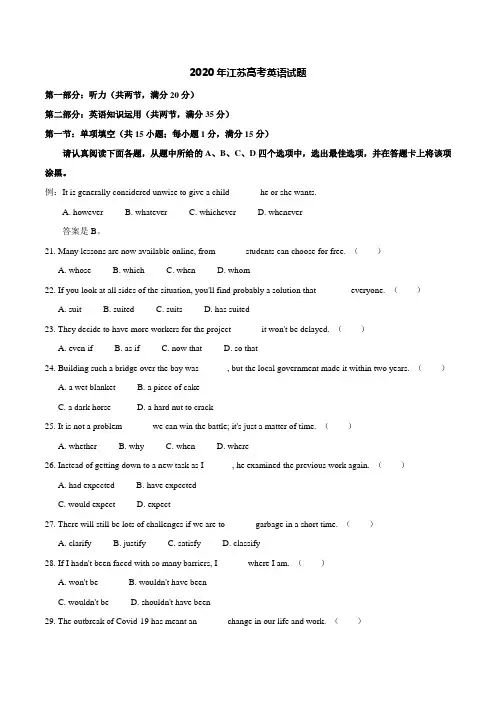
2020年江苏高考英语试题第一部分:听力(共两节,满分20分)第二部分:英语知识运用(共两节,满分35分)第一节:单项填空(共15小题;每小题1分,满分15分)请认真阅读下面各题,从题中所给的A、B、C、D四个选项中,选出最佳选项,并在答题卡上将该项涂黑。
例:It is generally considered unwise to give a child ______ he or she wants.A. howeverB. whateverC. whicheverD. whenever答案是B。
21. Many lessons are now available online, from ______ students can choose for free. ()A. whoseB. whichC. whenD. whom22. If you look at all sides of the situation, you'll find probably a solution that _______ everyone. ()A. suitB. suitedC. suitsD. has suited23. They decide to have more workers for the project ______ it won't be delayed. ()A. even ifB. as ifC. now thatD. so that24. Building such a bridge over the bay was ______, but the local government made it within two years. ()A. a wet blanketB. a piece of cakeC. a dark horseD. a hard nut to crack25. It is not a problem ______ we can win the battle; it's just a matter of time. ()A. whetherB. whyC. whenD. where26. Instead of getting down to a new task as I ______, he examined the previous work again. ()A. had expectedB. have expectedC. would expectD. expect27. There will still be lots of challenges if we are to ______ garbage in a short time. ()A. clarifyB. justifyC. satisfyD. classify28. If I hadn't been faced with so many barriers, I ______ where I am. ()A. won't beB. wouldn't have beenC. wouldn't beD. shouldn't have been29. The outbreak of Covid-19 has meant an ______ change in our life and work. ()A. absurdB. abruptC. allergicD. authentic30. Taking on this challenge will bring you ______ someone who shares your interests. ()A. in exchange forB. in answer toC. in contact withD. in memory of31. Technological innovations, ______ good marketing, will promote the sales of these products. ()A. combined withB. combining withC. having combined withD. to be combined with32. This actor often has the first two tricks planned before performing, and then goes for ______. ()A. whicheverB. wheneverC. whereverD. whatever33. The health security systems of many countries are undergoing considerable ______. ()A. reservationB. transformationC. distinctionD. submission34. The speed of 6G will exceed 125 GB/s, ______ a new generation of virtual reality. ()A. allowing forB. accounting forC. calling forD. compensating for35. —Do you know anything about Zhang Zhongjing?—______ He has been honored as a master doctor since the Eastern Han Dynasty. ()A. How come?B. So what?C. By all means.D. With pleasure.第二节:完形填空(共20小题;每小题1分,满分20分)请认真阅读下面短文,从短文后各题所给的A、B、C、D四个选项中,选出最佳选项,并在答题卡上将该项涂黑。
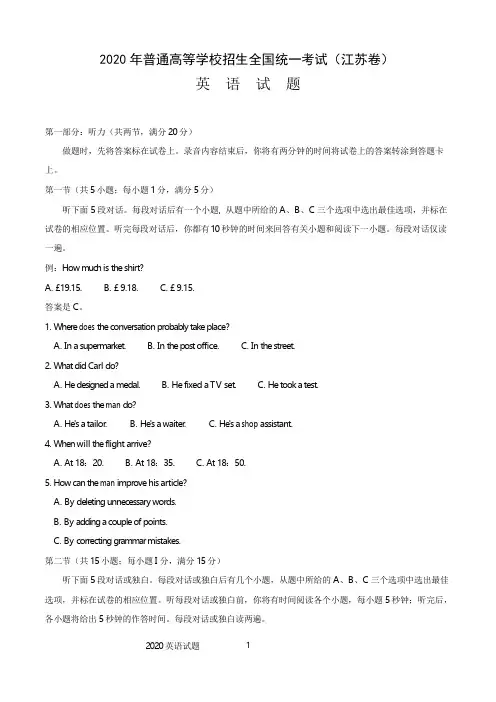
2020年普通高等学校招生全国统一考试(江苏卷)英语试题第一部分:听力(共两节,满分20分)做题时,先将答案标在试卷上。
录音内容结束后,你将有两分钟的时间将试卷上的答案转涂到答题卡上。
第一节(共5小题;每小题1分,满分5分)听下面5段对话。
每段对话后有一个小题,从题中所给的A、B、C三个选项中选出最佳选项,并标在试卷的相应位置。
听完每段对话后,你都有10秒钟的时间来回答有关小题和阅读下一小题。
每段对话仅读一遍。
例:How mu ch is the shirt?A.£19.15.B.£9.18.C.£9.15.答案是C。
1.Where does the conversation probably tak e place?A.In a supermarket.B.In the post office.C.In the street.2.What did Carl do?A.He designed a medal.B.He fixed a TV set.C.He took a test.3.What does the man do?A.He's a tailor.B.He's a waiter.C.He's a shop assistant.4.When will the flight arrive?A.At18:20.B.At18:35.C.At18:50.5.How can the man improve his article?A.By deleting unnecessary words.B.By adding a couple of points.C.By correcting g rammar mistakes.第二节(共15小题;每小题I分,满分15分)听下面5段对话或独白。
每段对话或独白后有几个小题,从题中所给的A、B、C三个选项中选出最佳选项,并标在试卷的相应位置。
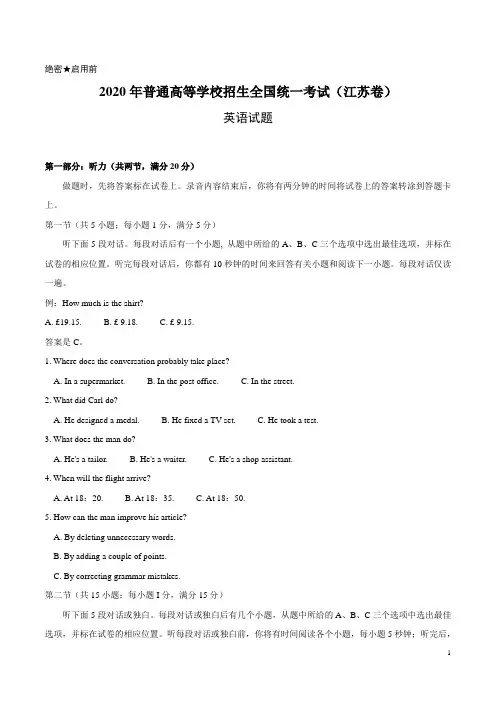
绝密★启用前2020年普通高等学校招生全国统一考试(江苏卷)英语试题第一部分:听力(共两节,满分20分)做题时,先将答案标在试卷上。
录音内容结束后,你将有两分钟的时间将试卷上的答案转涂到答题卡上。
第一节(共5小题;每小题1分,满分5分)听下面5段对话。
每段对话后有一个小题, 从题中所给的A、B、C三个选项中选出最佳选项,并标在试卷的相应位置。
听完每段对话后,你都有10秒钟的时间来回答有关小题和阅读下一小题。
每段对话仅读一遍。
例:How much is the shirt?A. £19.15.B. £ 9.18.C. £ 9.15.答案是C。
1. Where does the conversation probably take place?A. In a supermarket.B. In the post office.C. In the street.2. What did Carl do?A. He designed a medal.B. He fixed a TV set.C. He took a test.3. What does the man do?A. He's a tailor.B. He's a waiter.C. He's a shop assistant.4. When will the flight arrive?A. At 18:20.B. At 18:35.C. At 18:50.5. How can the man improve his article?A. By deleting unnecessary words.B. By adding a couple of points.C. By correcting grammar mistakes.第二节(共15小题;每小题I分,满分15分)听下面5段对话或独白。
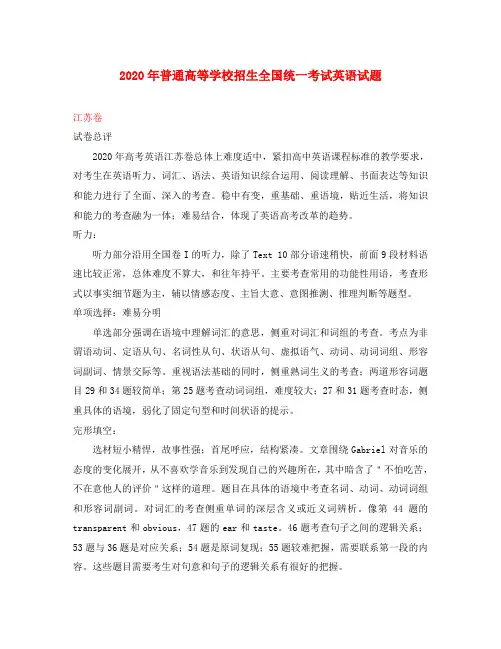
2020年普通高等学校招生全国统一考试英语试题江苏卷试卷总评2020年高考英语江苏卷总体上难度适中,紧扣高中英语课程标准的教学要求,对考生在英语听力、词汇、语法、英语知识综合运用、阅读理解、书面表达等知识和能力进行了全面、深入的考查。
稳中有变,重基础、重语境,贴近生活,将知识和能力的考查融为一体;难易结合,体现了英语高考改革的趋势。
听力:听力部分沿用全国卷I的听力,除了Text 10部分语速稍快,前面9段材料语速比较正常,总体难度不算大,和往年持平。
主要考查常用的功能性用语,考查形式以事实细节题为主,辅以情感态度、主旨大意、意图推测、推理判断等题型。
单项选择:难易分明单选部分强调在语境中理解词汇的意思,侧重对词汇和词组的考查。
考点为非谓语动词、定语从句、名词性从句、状语从句、虚拟语气、动词、动词词组、形容词副词、情景交际等。
重视语法基础的同时,侧重熟词生义的考查;两道形容词题目29和34题较简单;第25题考查动词词组,难度较大;27和31题考查时态,侧重具体的语境,弱化了固定句型和时间状语的提示。
完形填空:选材短小精悍,故事性强;首尾呼应,结构紧凑。
文章围绕Gabriel对音乐的态度的变化展开,从不喜欢学音乐到发现自己的兴趣所在,其中暗含了"不怕吃苦,不在意他人的评价"这样的道理。
题目在具体的语境中考查名词、动词、动词词组和形容词副词。
对词汇的考查侧重单词的深层含义或近义词辨析。
像第44题的transparent和obvious,47题的ear和taste。
46题考查句子之间的逻辑关系;53题与36题是对应关系;54题是原词复现;55题较难把握,需要联系第一段的内容。
这些题目需要考生对句意和句子的逻辑关系有很好的把握。
阅读部分:题量设置沿袭过去两年,难度有所降低阅读部分设题以细节理解题为主,推理判断题为辅。
A篇介绍了一本历史书籍,文章难度不大,可读性强。
第57题考查作者的写作手法,设题较为新颖,不过难度不大。
2020年普通高等学校招生全国统一考试(江苏卷)英语试题第一部分:听力(共两节,满分20分)做题时,先将答案标在试卷上。
录音内容结束后,你将有两分钟的时间将试卷上的答案转涂到答题卡上。
第一节(共5小题;每小题1分,满分5分)听下面5段对话。
每段对话后有一个小题, 从题中所给的A、B、C三个选项中选出最佳选项,并标在试卷的相应位置。
听完每段对话后,你都有10秒钟的时间来回答有关小题和阅读下一小题。
每段对话仅读一遍。
例:How much is the shirt?A. £19.15.B. £ 9.18.C. £ 9.15.答案是C。
1. Where does the conversation probably take place?A. In a supermarket.B. In the post office.C. In the street.2. What did Carl do?A. He designed a medal.B. He fixed a TV set.C. He took a test.3. What does the man do?A. He's a tailor.B. He's a waiter.C. He's a shop assistant.4. When will the flight arrive?A. At 18:20.B. At 18:35.C. At 18:50.5. How can the man improve his article?A. By deleting unnecessary words.B. By adding a couple of points.C. By correcting grammar mistakes.第二节(共15小题;每小题I分,满分15分)听下面5段对话或独白。
每段对话或独白后有几个小题,从题中所给的A、B、C三个选项中选出最佳选项,并标在试卷的相应位置。
2020年全国普通高等学校招生统一考试试卷江苏卷英语第一部分:听力(共两节,满分20分)做题时,先将答案标在试卷上。
录音内容结束后,你将有两分钟的时间将试卷上的答案转涂到答题卡上。
第一节(共5小题;每小题1分,满分5分)听下面5段对话。
每段对话后有一个小题, 从题中所给的A、B、C三个选项中选出最佳选项,并标在试卷的相应位置。
听完每段对话后,你都有10秒钟的时间来回答有关小题和阅读下一小题。
每段对话仅读一遍。
例:How much is the shirt?A. £19.15.B. £ 9.18.C. £ 9.15.答案是C。
1. Where does the conversation probably take place?A. In a supermarket.B. In the post office.C. In the street.2. What did Carl do?A. He designed a medal.B. He fixed a TV set.C. He took a test.3. What does the man do?A. He's a tailor.B. He's a waiter.C. He's a shop assistant.4. When will the flight arrive?A. At 18:20.B. At 18:35.C. At 18:50.5. How can the man improve his article?A. By deleting unnecessary words.B. By adding a couple of points.C. By correcting grammar mistakes.第二节(共15小题;每小题I分,满分15分)听下面5段对话或独白。
每段对话或独白后有几个小题,从题中所给的A、B、C三个选项中选出最佳选项,并标在试卷的相应位置。
2020年普通高等学校招生全国统一考试英语(江苏卷,含答案)第一部分:听力(共两节,满分20分)做题时,先将答案标在试卷上。
录音内容结束后,你将有两分钟的时间将试卷上的答案转涂到答题卡上。
第一节(共5小题;每小题1分,满分5分)听下面5段对话。
每段对话后有一个小题,从题中所给的A、B、C三个选项中选出最佳选项,并标在试卷的相应位置。
听完每段对话后,你都有10秒钟的时间来回答有关小题和阅读下一小题。
每段对话仅读一遍。
例:How much is the shirt?A. £19.15.B. £9.15.C. £9.18.答案是B。
1. What do the speakers need to buy?A. A fridge.B. A dinner table.C. A few chairs.2. Where are the speakers?A. In a restaurant.B. In a hotel.C. In a school.3. What does the woman mean?A. Cathy will be at the party.B. Cathy is too busy to come.C. Cathy is going to be invited.4. Why does the woman plan to go to town?A. To pay her bills in the bank.B. To buy books in a bookstore.C. To get some money from the bank.5. What is the woman trying to do?A. Finish some writing.B. Print an article.C. Find a newspaper.第二节(共15小题;每小题1分,满分15分)听下面5段对话。
每段对话后有几个小题,从题中所给的A、B、C三个选项中选出最佳选项,并标在试卷的相应位置。
2020年普通高等学校招生全国统一考试(江苏卷)英语试题第一部分听力(共两节, 满分20分)做题时, 先将答案标在试卷上。
录音内容结束后, 你将有两分钟的时间将试卷上的答案转涂到答题卡上。
第一节(共5小题; 每小题1分, 满分5分)听下面5段对话。
每段对话后有一个小题, 从题中所给的A、B、C三个选项中选出最佳选项, 并标在试卷的相应位置。
听完每段对话后, 你都有10秒钟的时间来回答有关小题和阅读下一小题。
每段对话仅读一遍。
例:How much is the shirt?A. £19.15.B. £59.18.C. £9.15.答案是C。
1.Where does the conversation probably take place?A. In a supermarket.B. In the post officeC. In the street.2.What did Carl do?A. He designed a medal.B. He fixed a TV set.C. He took a test.3.What does the man do?A. He’s a tailor.B. He’s a waiter.C. He’s a shop assistant.4.When will the flight arrive?A. At 18:20.B. At 18:35.C. At 18:50.5.How can the man improve his article?A. By deleting unnecessary words.B. By adding a couple of points.C. By correcting grammar mistakes.第二节(共15小题:每小题I分, 满分15分)听下面5段对话或独白。
每段对话或独白后有几个小题, 从题中所给的A、B、C三个选项中选出最佳选项, 并标在试卷的相应位置。
英语试题第一部分:听力(共两节,满分20分)做题时,先将答案标在试卷上。
录音内容结束后,你将有两分钟的时间将试卷上的答案转涂到答题卡上。
第一节(共5小题;每小题1分,满分5分)听下面5段对话。
每段对话后有一个小题, 从题中所给的A、B、C三个选项中选出最佳选项,并标在试卷的相应位置。
听完每段对话后,你都有10秒钟的时间来回答有关小题和阅读下一小题。
每段对话仅读一遍。
例:How much is the shirt?A. £19.15.B. £ 9.18.C. £ 9.15.答案是C。
1. Where does the conversation probably take place?A. In a supermarket.B. In the post office.C. In the street.2. What did Carl do?A. He designed a medal.B. He fixed a TV set.C. He took a test.3. What does the man do?A. He's a tailor.B. He's a waiter.C. He's a shop assistant.4. When will the flight arrive?A. At 18:20.B. At 18:35.C. At 18:50.5. How can the man improve his article?A. By deleting unnecessary words.B. By adding a couple of points.C. By correcting grammar mistakes.第二节(共15小题;每小题I分,满分15分)听下面5段对话或独白。
每段对话或独白后有几个小题,从题中所给的A、B、C三个选项中选出最佳选项,并标在试卷的相应位置。
绝密★启用前江苏省2020年普通高等学校招生全国统一考试英语试题第一部分:听力(共两节,满分20分)做题时,先将答案标在试卷上。
录音内容结束后,你将有两分钟的时间将试卷上的答案转涂到答题卡上。
第一节(共5小题;每小题1分,满分5分)听下面5段对话。
每段对话后有一个小题, 从题中所给的A、B、C三个选项中选出最佳选项,并标在试卷的相应位置。
听完每段对话后,你都有10秒钟的时间来回答有关小题和阅读下一小题。
每段对话仅读一遍。
例:How much is the shirt?A. £19.15.B. £ 9.18.C. £ 9.15.答案是C。
1. Where does the conversation probably take place?A. In a supermarket.B. In the post office.C. In the street.2. What did Carl do?A. He designed a medal.B. He fixed a TV set.C. He took a test.3. What does the man do?A. He's a tailor.B. He's a waiter.C. He's a shop assistant.4. When will the flight arrive?A. At 18:20.B. At 18:35.C. At 18:50.5. How can the man improve his article?A. By deleting unnecessary words.B. By adding a couple of points.C. By correcting grammar mistakes.第二节(共15小题;每小题I分,满分15分)听下面5段对话或独白。
2020年江苏省高考英语试卷第一部分:听力(共两节,满分20分)做题时,先将答案标在试卷上。
录音内容结束后,你将有两分钟的时间将试卷上的答案转涂到答题卡上。
第一节(共5小题;每小题1分,满分5分)听下面5段对话。
每段对话后有一个小题, 从题中所给的A、B、C三个选项中选出最佳选项,并标在试卷的相应位置。
听完每段对话后,你都有10秒钟的时间来回答有关小题和阅读下一小题。
每段对话仅读一遍。
例:How much is the shirt?A. £19.15.B. £ 9.18.C. £ 9.15.答案是C。
1. Where does the conversation probably take place?A. In a supermarket.B. In the post office.C. In the street.2. What did Carl do?A. He designed a medal.B. He fixed a TV set.C. He took a test.3. What does the man do?A. He's a tailor.B. He's a waiter.C. He's a shop assistant.4. When will the flight arrive?A. At 18:20.B. At 18:35.C. At 18:50.5. How can the man improve his article?A. By deleting unnecessary words.B. By adding a couple of points.C. By correcting grammar mistakes.第二节(共15小题;每小题I分,满分15分)听下面5段对话或独白。
每段对话或独白后有几个小题,从题中所给的A、B、C三个选项中选出最佳选项,并标在试卷的相应位置。
听每段对话或独白前,你将有时间阅读各个小题,每小题5秒钟;听完后,各小题将给出5秒钟的作答时间。
每段对话或独白读两遍。
听第6段材料,回答第6、7题。
6. What does Bill often do on Friday night?A. Visit his parents.B. Go to the movies.C. Walk along Broadway.7. Who watches musical plays most often?A. Bill.B. Sarah.C. Bill's parents.听第7段材料,回答第8、9题。
8. Why does David want to speak to Mike?A. To invite him to a party.B. To discuss a schedule.C. To call off a meeting.9. What do we know about the speakers?A. They are colleagues.B. They are close friends.C. They've never met before. 听第8段材料,回答第10至12题。
10. What kind of camera does the man want?A. A TV camera.B. A video camera.C. A movie camera.11. Which function is the man most interested in?A. Underwater filming.B. A large memory.C. Auto-focus.12. How much would the man pay for the second camera?A. 950 euros.B. 650 euros.C. 470 euros.听第9段材料,回答第13至16题。
13. Who is Clifford?A. A little girl.B. The man's pet.C. A fictional character.14. Who suggested that Norman paint for children's books?A. His wife.B. Elizabeth.C. A publisher.15. What is Norman's story based on?A. A book.B. A painting.C. A young woman.16. What is it that shocked Norman?A. His unexpected success.B. His efforts made in vain.C. His editor's disagreement.听第10段材料,回答第17至20题。
17. Who would like to make small talk according to the speaker?A. Relatives.B. Strangers.C. Visitors.18. Why do people have small talk?A. To express opinions.B. To avoid arguments. C To show friendliness.19. Which of the following is a frequent topic in small talk?A. Politics.B. Movies.C. Salaries.20. What does the speaker recommend at the end of his lecture?A. Asking open-ended questions.B. Feeling free to change topics.C. Making small talk interesting.第二部分:英语知识运用(共两节,满分35分)第一节:单项填空(共15小题;每小题1分,满分15分)请认真阅读下面各题,从题中所给的A、B、C、D四个选项中,选出最佳选项,并在答题卡上将该项涂黑。
例:It is generally considered unwise to give a child ______ he or she wants.A. howeverB. whateverC. whicheverD. whenever答案是B。
21. Many lessons are now available online, from ______ students can choose for free. ()A. whoseB. whichC. whenD. whom22. If you look at all sides of the situation, you'll find probably a solution that _______ everyone. ()A. suitB. suitedC. suitsD. has suited23. They decide to have more workers for the project ______ it won't be delayed. ()A. even ifB. as ifC. now thatD. so that24. Building such a bridge over the bay was ______, but the local government made it within two years. ()A. a wet blanketB. a piece of cakeC. a dark horseD. a hard nut to crack25. It is not a problem ______ we can win the battle; it's just a matter of time. ()A. whetherB. whyC. whenD. where26. Instead of getting down to a new task as I ______, he examined the previous work again. ()A. had expectedB. have expectedC. would expectD. expect27. There will still be lots of challenges if we are to ______ garbage in a short time. ()A. clarifyB. justifyC. satisfyD. classify28. If I hadn't been faced with so many barriers, I ______ where I am. ()A. won't beB. wouldn't have beenC. wouldn't beD. shouldn't have been29. The outbreak of Covid-19 has meant an ______ change in our life and work. ()A. absurdB. abruptC. allergicD. authentic30. Taking on this challenge will bring you ______ someone who shares your interests. ()A. in exchange forB. in answer toC. in contact withD. in memory of31. Technological innovations, ______ good marketing, will promote the sales of these products. ()A. combined withB. combining withC. having combined withD. to be combined with32. This actor often has the first two tricks planned before performing, and then goes for ______. ()A. whicheverB. wheneverC. whereverD. whatever33. The health security systems of many countries are undergoing considerable ______. ()A. reservationB. transformationC. distinctionD. submission34. The speed of 6G will exceed 125 GB/s, ______ a new generation of virtual reality. ()A. allowing forB. accounting forC. calling forD. compensating for35. —Do you know anything about Zhang Zhongjing?—______ He has been honored as a master doctor since the Eastern Han Dynasty. ()A. How come?B. So what?C. By all means.D. With pleasure.第二节:完形填空(共20小题;每小题1分,满分20分)请认真阅读下面短文,从短文后各题所给的A、B、C、D四个选项中,选出最佳选项,并在答题卡上将该项涂黑。